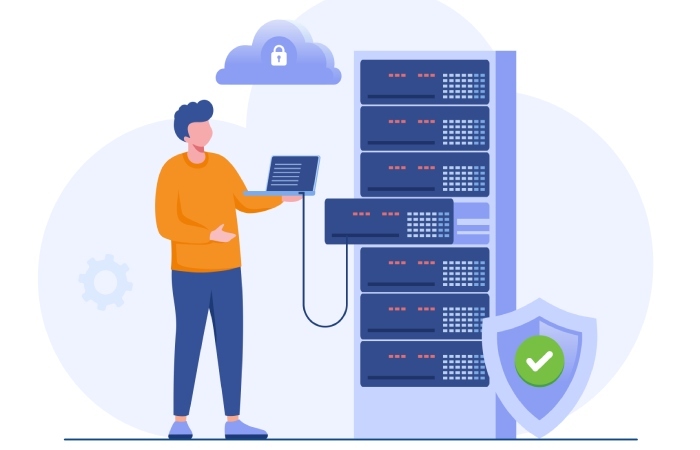Authoritative vs Recursive DNS: Understanding the Key Differences
Navigating the internet is like exploring a vast city filled with countless destinations, but what happens when you don’t have a map? This is where DNS (Domain Name System) comes in—serving as the essential guide that translates user-friendly domain names into numerical addresses that computers understand. Understanding how this crucial system operates can help demystify the often overcomplicated world of online browsing.
In this article, we’ll break down the two main types of DNS servers: authoritative and recursive. We’ll explore their distinct roles, differences in functionality, and how they work together to ensure our online experiences are smooth and efficient. So, let’s dive in and uncover these digital navigators!
Authoritative DNS servers store and provide definitive answers to queries about specific domain names, while recursive DNS servers act as intermediaries that facilitate user queries by contacting authoritative servers to retrieve the necessary information. This distinction is crucial for understanding how domain name resolution works in internet navigation.
Authoritative DNS Servers Explained
At their core, authoritative DNS servers are like knowledgeable librarians at a vast digital library. They provide definitive answers to queries about specific domain names by storing critical information in “zone files.” These zone files contain a wealth of data—not just the relationship between domain names and their corresponding IP addresses (like mapping “example.com” to its numerical counterpart, 198.51.100.1), but also other important records such as mail exchange (MX) records, which determine where email for that domain should be delivered, and text (TXT) records that can provide additional details about the domain.
The role of an authoritative DNS server goes beyond merely responding to requests; it embodies reliability. When a user types in a website address, it’s the authoritative DNS server that quickly responds with the necessary IP address, allowing access to desired content without delay. This means that these servers must operate efficiently and maintain high uptime—failing to do so can leave users frustrated and unable to reach websites. Time-sensitive transactions or even critical communications depend on this seamless functionality.
The speed with which authoritative servers respond can considerably influence user experiences online. Slow response times could lead to impatient users abandoning web pages before they fully load.
Furthermore, there are two types of authoritative DNS servers: primary (or master) servers that contain original DNS records and secondary (or slave) servers that replicate those records for redundancy and improved performance. This setup ensures balance; if one server is busy or down, the other can maintain service continuity.
As we progress in our understanding of how these functions relate within the broader framework of internet navigation, it is crucial to recognize that authoritative DNS servers also face inherent security considerations.

Since they hold the definitive answer to domain mappings, they are prime targets for cyber attacks aimed at redirecting traffic or disrupting services. Therefore, robust security measures are essential. This includes implementing protocols such as DNSSEC (Domain Name System Security Extensions), which adds a layer of authentication to prevent malicious tampering with zone file entries. Just as authoritative and recursive DNS ensure accurate and efficient domain resolution, implementing SPF, DKIM, and DMARC in your DNS records protects your domain from email spoofing and strengthens overall cybersecurity.
Regular maintenance of these servers is equally vital; ensuring that all stored data remains accurate helps prevent connectivity issues due to outdated or incorrect information. Organizations often find themselves maintaining a mix of both primary and secondary authoritative servers for these reasons.
With their specialized function and critical importance in maintaining efficient internet navigation, it’s clear that understanding how authoritative DNS servers work sets the stage for exploring the next layer of this essential infrastructure.
Recursive DNS Servers Explained
Recursive DNS servers serve as the gatekeepers of your internet experience, facilitating the crucial communication between users and authoritative servers. When you type a web address into your browser, it is this server that springs into action, seeking the corresponding IP address essential for routing your request to the desired website. If that information isn’t already stored in its cache—which is like a memory bank for frequently accessed data—the recursive server will initiate a series of queries to find the answer. It’s a systematic process: just as a detective piecing together clues, it checks various authoritative DNS servers, all organized in a hierarchical structure, to fetch the necessary information.
Think of it as if you’ve asked a friend where to buy your favorite book. If they don’t have it on hand, they’ll cleverly connect with others until they pinpoint the store that does.
The Caching Mechanism
One of the standout features of recursive DNS servers is their ability to cache results. This means once a DNS query is successfully resolved, the response gets stored in memory. The next time that particular query arises—let’s say you’re revisiting that same favorite website—the server can access its cache rather than starting from scratch.
By eliminating repetitive lookups, caching can dramatically boost performance and decrease response times, often averaging around 20-50 milliseconds under optimal conditions. However, maintaining an accurate cache is pivotal; without refreshing this stored information periodically, users might find that outdated or incorrect data leads them astray.
With clearer insight into the caching function, consider how these servers prioritize user experience through efficient responses.

Enhancing User Experience
User experience hinges heavily on the effectiveness of recursive DNS servers. A reliable server not only boosts speed through caching but also enhances security features such as DNSSEC (Domain Name System Security Extensions). By verifying responses against potential threats, these security measures protect users from malicious attacks while browsing online—making them invaluable in today’s cyber landscape.
Moreover, usage statistics indicate that approximately 70% of DNS queries are managed by these recursive servers—a testament to their foundational role within internet infrastructure. Without them, users would find themselves entering cumbersome IP addresses manually for each site they wish to visit, making web navigation a daunting task.
Imagine trying to remember every single phone number essential for your daily communications—it would be an overwhelming challenge!
Grasping how recursive servers operate and enhance our browsing significantly sets the stage for understanding their distinct functions compared to other essential systems in internet navigation.
Functional Differences
To fully appreciate how these servers operate, it’s essential to understand their key functional differences, particularly in data handling and query processing.
When it comes to data storage, authoritative DNS servers are like librarians holding all the original manuscripts of books, storing comprehensive DNS records for domains such as IP addresses, MX (Mail Exchange) records, and more. In contrast, recursive DNS servers act as diligent researchers who store only the cached copies of this data. They leverage this cache to provide quicker results when users make repeated requests, saving time and resources while enhancing user experience.
This leads us to how each server manages queries differently.
Authoritative DNS servers directly respond to queries related to their domains. Think of them as the ultimate authority on certain subjects; whenever someone asks a question about a specific domain, these servers have accurate answers readily available without needing to consult anyone else.

On the other hand, recursive DNS servers serve as intermediaries, fetching data from various authoritative servers on behalf of the user. They handle the complexities involved with looking up domain names by sequentially contacting multiple authoritative sources until they find the needed information. This process not only simplifies life for users but can also speed things up due to caching.
Now let’s discuss how these differences manifest in update protocols.
Update frequency is another crucial aspect of functioning. Authoritative DNS servers receive updates from domain registrars or administrators anytime there are changes—like an address change for a business or a new website addition—keeping their records current and accurate.
Recursive DNS servers operate differently; they refresh their cache based on TTL (time-to-live) values set by authoritative servers. This means that while they don’t constantly update every piece of information, they work diligently to maintain fresh and relevant data through periodic checks based on those TTL limits.
Thus, while both server types collaborate seamlessly to give us results, they do so with distinct roles in mind—one storing definitive data and responding directly, and the other facilitating that information retrieval for end users efficiently through caching and querying mechanisms.
With an understanding of their functional differences established, we can now explore the advantages each type brings to the table in terms of performance and reliability.
Key Benefits of Each
Authoritative DNS servers stand out for their reliability and security. By storing and managing DNS records, they serve as the go-to source for accurate information about domain names. When you type a website into your browser, it’s these servers that provide the definitive answer, ensuring you reach the intended destination without being misled by outdated or incorrect data. This is crucial for businesses that depend on their online presence; even a minor error in DNS records can lead to significant losses.
Moreover, they enhance security through mechanisms like DNSSEC (Domain Name System Security Extensions), which helps protect against malicious attacks by ensuring that the responses from these servers are authentic and unaltered.

On the other hand, recursive DNS servers offer inherent efficiency and usability. They act as a middleman, caching frequently requested data so that when you revisit a site, your experience is faster. Imagine wanting to visit your favorite news site multiple times throughout the day; thanks to the cached data stored by your recursive server, you won’t have to wait for the connection to complete each time because it remembers where to find it. This dramatically reduces latency, improving your overall browsing speed.
Additionally, recursive servers simplify user experience by handling complex queries seamlessly. Users don’t have to worry about navigating through different layers of server queries—this is taken care of automatically, making internet navigation fluid and stress-free.
While authoritative servers ensure that you receive accurate information about domain names, recursive servers make sure that this information is delivered quickly and efficiently each time you need it.
As we transition into exploring real-world applications of these server types, we can better understand how their functionalities enhance connectivity in our digital experiences today.
Practical Use Cases
In business environments, the role of authoritative DNS servers becomes paramount. When a domain name registrar manages numerous client domains, having an accurate domain-to-IP mapping is essential to ensure that all websites resolve correctly. If you think about it, it’s akin to having a well-organized address book; if the addresses are wrong, no one will find their way home. This reliability ensures smooth functionality for clients and fosters trust between the registrar and its users.
However, it isn’t just businesses that benefit; personal Internet usage also sees substantial advantages from these systems.
For the average user, Internet Service Providers (ISPs) most often rely on recursive DNS servers to streamline internet access. These servers act as intermediaries that fetch necessary information quickly, significantly reducing load times. Imagine you’re attempting to view your favorite cat video online; the last thing you want is to wait an eternity because the DNS server is slow! Recursive servers enhance everyday browsing experiences by remembering commonly accessed sites through caching, which makes accessing them faster on subsequent visits.
Beyond individual users and businesses, website owners also play a vital role in this dynamic.

Website administrators lean heavily on authoritative DNS servers to guarantee that their sites can be resolved accurately across the globe. This accuracy is non-negotiable; without it, potential visitors might never reach their intended destinations while searching online. Picture a bustling marketplace: if vendors can’t be found due to faulty addressing, foot traffic stagnates. Therefore, an authoritative server maintains operational integrity and can indirectly influence web traffic and engagement levels.
By recognizing how these technologies fit into personal, professional, and broader networking scenarios, individuals can make informed decisions regarding their internet setups. Let’s explore practical situations that highlight these concepts more vividly.
Real-World Examples
Let’s explore how these DNS servers operate in real-world scenarios. One notable player is Cisco Umbrella, a service designed with both security and performance in mind. Cisco Umbrella serves as a recursive DNS provider, meaning it handles DNS queries by caching results for better speed and efficiency. What truly sets it apart is its focus on cybersecurity; it offers an extra layer of protection by blocking harmful sites, ensuring that users gain fast access to their desired content while also protecting themselves from potential online threats.
Picture this: You’re at home, trying to catch up on your favorite streaming series. Suddenly, you hit a stumbling block—a malicious site appears attempting to redirect you away from your show. If you were using Cisco Umbrella, that problem would likely be resolved before it could even reach your screen. This proactive approach creates a safer online experience, giving users peace of mind while navigating the digital landscape.
Now let’s widen our scope to include another major player in the DNS arena—Cloudflare.
Unlike the singular role that Cisco Umbrella fills, Cloudflare operates on two fronts by offering both recursive and authoritative DNS services. This dual functionality enhances the speed of resolving domain names while managing its own domain server records. Users benefit from incredibly low latency and seamless browsing experiences for millions of websites worldwide.
Let’s consider a real-world example: Cloudflare’s 1.1.1.1 service has become extremely popular among individuals seeking faster internet connections with enhanced privacy. Their policy of not logging user data stands out as a significant privacy advantage, garnering trust from an audience increasingly conscious of how their browsing habits can be tracked.
| Service | Type of DNS Server | Key Benefit |
| Cisco Umbrella | Recursive DNS | Enhanced Security & Reliability |
| Cloudflare | Both Recursive & Authoritative | Speed & Privacy |
These examples illustrate not just the functionality of these systems but also their profound impact on how we navigate the internet daily. As we shift towards a more interconnected world, understanding these differences becomes crucial—not just for tech enthusiasts but for anyone who uses the web regularly.
As we advance, several important security and privacy considerations surrounding DNS services merit our attention.
Impact on Internet Navigation
The seamless browsing experience many of us enjoy today can be largely attributed to the effective collaboration between authoritative and recursive DNS servers. Think of it like a well-coordinated team: while the authoritative DNS provides essential information about domain names and their corresponding IP addresses, the recursive DNS takes on the role of a diligent researcher, caching frequently requested data to enhance speed and efficiency.
Imagine you’re searching for your favorite recipe online. Instead of floundering through countless pages, the recursive DNS quickly retrieves previously cached information, ensuring that your request is addressed almost instantaneously. Recent studies estimate that approximately 85% of all DNS queries are resolved by these caching servers, which not only speeds up load times but also alleviates traffic on the authoritative servers. This relationship becomes even more critical when we consider how often browsers switch between various domains as we explore links.
Without the reliability of authoritative DNS servers, navigating the internet would veer into chaos. Users would experience significant delays faced with repeated bottlenecks whenever they entered a website’s address. These crucial servers provide definitive answers regarding IP allocations and rectify any potential discrepancies in domain resolutions. It’s this symbiotic partnership that enables fluidity in our online activities.
Beyond mere efficiency, the functionality of DNS has broader implications for user experience and security. Optimizing our use of both types of DNS servers enhances not just speed but also reliability and maintains the integrity of our web interactions. Visitors expect fast-loading pages; unmet expectations can lead to frustration or abandonment of a site altogether. In this digital age where information is readily available at our fingertips, even mere seconds can spell the difference between satisfied users and missed opportunities.
By understanding how both authoritative and recursive DNS servers contribute to our browsing experience, we can appreciate their roles in creating a more robust digital environment that prioritizes speed, accuracy, and reliability.
As we navigate an increasingly digital world, recognizing the importance of these DNS systems is crucial for maintaining an efficient online presence. The synergy between authoritative and recursive DNS will continue to shape our internet experiences for years to come.
How do authoritative DNS servers differ in function from recursive DNS servers?
Authoritative DNS servers store and provide the definitive records for domain names, responding to queries with the actual IP addresses of the domains they manage, while recursive DNS servers act as intermediaries that query various authoritative servers on behalf of clients to resolve domain names into IP addresses. This difference in function means authoritative servers directly hold the data, whereas recursive servers aggregate information from multiple sources. According to a 2023 report by the Internet Systems Consortium, authoritative servers handle approximately 30% of all DNS queries, emphasizing their essential role in domain resolution.
What are the security implications of using recursive DNS servers?
Using recursive DNS servers can expose users to various security implications, including susceptibility to DNS spoofing and cache poisoning attacks. Attackers can manipulate the response from a recursive server, redirecting unsuspecting users to malicious sites. According to a report by the Cybersecurity and Infrastructure Security Agency (CISA) in 2022, nearly 40% of organizations experienced DNS-related attacks, emphasizing the importance of securing recursive DNS configurations with measures like DNSSEC and filtering mechanisms to mitigate risks associated with untrusted sources.

Can a single server act as both an authoritative and a recursive DNS server?
Yes, a single server can act as both an authoritative and a recursive DNS server. In this configuration, the server can resolve domain name queries from clients while also providing authoritative responses for specific domains it manages. This dual functionality is often used in smaller networks or setups where resources are limited, allowing for efficient management of DNS queries without needing separate servers. While there are no widely quoted statistics on the exact prevalence of this setup, it’s common in many home and small business environments due to its simplicity and cost-effectiveness.
How do changes in
Changes in DNS configurations can significantly affect website accessibility and performance. For instance, when you update a domain’s authoritative DNS records, it may take time for those changes to propagate across recursive DNS servers worldwide, potentially leading to temporary outages or misdirected traffic. Studies show that nearly 80% of users expect a website to load within three seconds; thus, delays due to DNS changes can adversely impact user experience and conversion rates. Hence, understanding the dynamics between authoritative and recursive DNS is crucial for maintaining optimal online presence.
What role does caching play in the performance of recursive DNS?
Caching plays a crucial role in the performance of recursive DNS by significantly reducing the response time for repeated queries and minimizing network traffic. When a recursive DNS server caches the results of previous DNS lookups, it can serve subsequent requests for the same domains almost instantly, rather than querying authoritative servers again.
This not only speeds up user experience—often resulting in an average response time decreased from hundreds of milliseconds to mere milliseconds—but also helps to alleviate bandwidth usage on both local networks and upstream servers. In fact, studies show that effective caching can improve query response times by as much as 50-90%, greatly enhancing overall efficiency and reliability of internet navigation.







